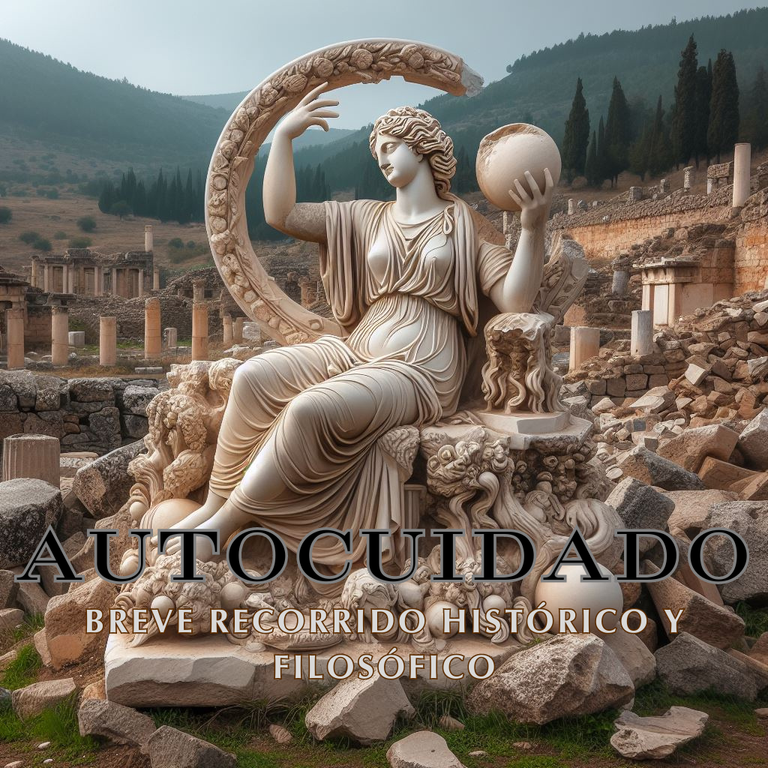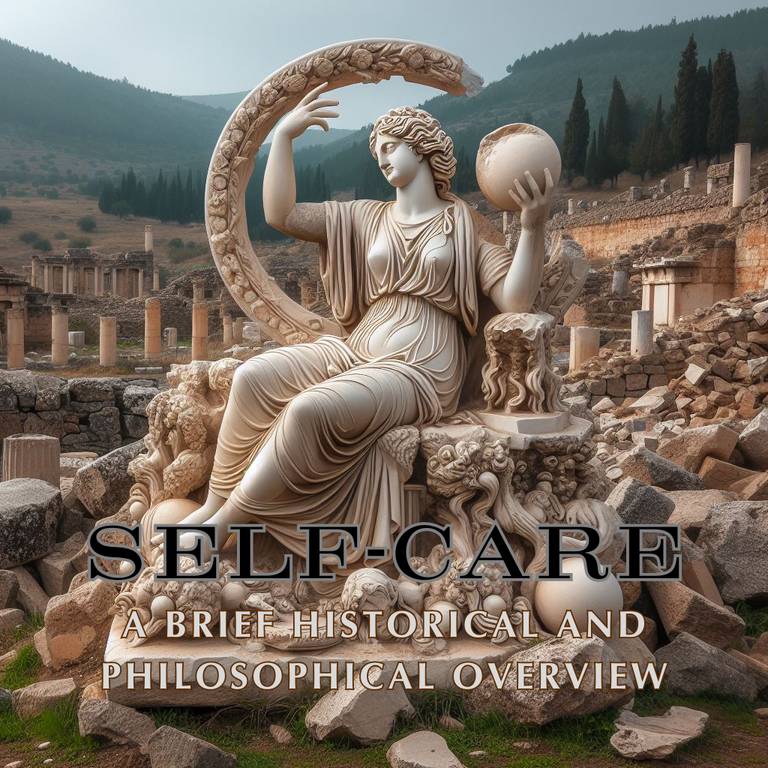Autocuidado: breve recorrido histórico y filosófico | Self-care: a brief historical and philosophical overview [ES/EN]

Mucho se habla del autocuidado, incluso de manera indiferente haciendo referencia tanto a comportamientos que de verdad inciden en el sí mismo, como otros que llegan a rozar lo narcisista. Como casi siempre, esto tiene que ver con dinámicas sociales que se llevan a cabo en la actualidad. Si nos fijamos, hoy por hoy apuntar al sí mismo se ha vuelto cotidiano debido al consumismo en el que nos vemos envueltos en donde, más allá de preocuparnos de manera consciente y responsable de nuestro propio cuidado, solo nos llenamos cada vez más de objetos fetichistas tanto concretos como abstractos que aumentan el hedonismo característico de la época. Es así como los discursos dominantes se provechan de esto para apuntar a donde no es y entonces ocurre que nos dejamos llevar por un «autocuidado» hueco, falso, conveniente para quien lo cita. Es por eso necesitamos acercarnos realmente y desde la ciencia, a lo que es este constructo teórico que, si bien no se conoce realmente y por ende, no se aplica como tal, al menos forma parte de la cotidianidad.
En la antigüedad, se creía que la salud era un regalo divino opuesto a la enfermedad, que era vista como un castigo. Se concebía la salud y la enfermedad como dos extremos de un continuo, influenciados por las prácticas de cuidado que determinaban la vida de las personas y su adaptación al contexto. Se creía que una buena adaptación correspondía a una gracia divina de disfrutar de buena salud, mientras que la falta de cuidado resultaba en enfermedad como castigo. Este pensamiento pudo haber influido en el surgimiento del modelo biomédico predominante en los sistemas de salud a nivel mundial, que se enfoca en atacar y curar la enfermedad, considerándola como resultado de desequilibrios bioquímicos o neurofisiológicos que afectan el funcionamiento del cuerpo.
«Yo no digo que la ética es el cuidado de sí, sino que, en la Antigüedad, la ética como práctica reflexiva de la libertad ha girado en torno a este imperativo fundamental "cuida de ti mismo"». (Foucault, 1984)
Incluso se puede hablar de la evolución del autocuidado desde la religión, porque, antes de la llegada del cristianismo, el autocuidado en el mundo grecorromano era la forma en que la libertad individual era reflexionada como ética, o sea, pensar en cuidarse era lo esperado y aceptado para la sociedad de entonces como forma de vivir y desarrollarse. Sin embargo, con la llegada de dicha religión, pasó a ser visto como un egoísmo o interés individual contrario a lo que se promulgaba entonces del «amor al prójimo». Pero resulta curioso cómo en este punto, dicha entrega al otro era vista como una forma de cuidarse a sí mismo en un «más allá», mediante la renuncia en el aquí y el ahora.
Por otro lado, el autocuidado no se puede desentender al contexto en el que se lleva a cabo. Supone «conocer de uno mismo», pero también estar advertidos de las reglas o normas que rigen las relaciones humanas en las que nos vemos inmersos y los discursos que nos definen. Es así como el autocuidado no puede verse limitado únicamente a enfocarse en uno mismo sin tomar en cuenta el entorno, porque entonces dejaría de ser autocuidado para convertirse en mero narcisismo o arrogancia.
Hoy en día, la humanidad se ha sentido desconectada del mundo debido al impacto de los avances tecnológicos, lo que ha generado una crisis de civilización. Esta falta de interés y descuido ha llevado a un distanciamiento de la realidad, por lo que se hace necesario desarrollar una filosofía del cuidado que permita recuperar la responsabilidad hacia uno mismo y la presencia en el mundo. El acto de cuidar implica ocuparse, preocuparse, asumir responsabilidades y comprometerse afectivamente con los demás, y va más allá de un simple momento de atención. Dado que está influenciado por la cultura, es diverso, plural y universal. Es algo sin lo cual dejaríamos de ser humanos, ya que forma parte de nuestra naturaleza y constitución, y es inconcebible vivir sin él.
En especial, Foucault, manifiesta una visión bastante interesante del autocuidado. Se trata de que dicho filósofo habla del cuidado de sí como ético, pero que implica necesariamente una relación con los otros ya que, en la medida en que asumir un verdadero cuidado de sí nos hace asumir, a la vez, ciertas posiciones de reconocimiento en un contexto dado, dichas posiciones constituyen referentes o influencias para los demás. Por tanto, el cuidarnos nosotros mismos implica un cuidado de los demás. Pero la relación con los otros no se acaba aquí, sino que también, para cuidar de nosotros necesitamos de los demás en el sentido de que, para cuidarnos, necesitamos aprender de cómo se cuidan los otros o cómo esos otros nos enseñan a cuidarnos. En este sentido se habla de que el cuidado de sí es ético como práctica reflexionada de la libertad.

«El cuidado se entiende por un modo de ser del humano en el mundo, inherente a nuestra propia existencia, que se manifiesta por las significaciones que le damos a nuestras relaciones con los otros». (Roach, 1992)
El autocuidado siempre apunta al cuidado de los otros, porque implica comprender la posición de poder que encarnamos en toda relación y el impacto que tiene en cada uno. Si, por el contrario, se trata de alguien que no es capaz de frenar sus más fieras ambiciones o se deja llevar por patrones de conductas nocivas, esa persona además de no estar cuidándose a sí misma, definitivamente no estará cuidando a las personas que le rodea así sea de manera objetiva o inconsciente. Se habla de que al ejercer el cuidado de sí, una vez más, se ejerce un poder tanto sobre los demás como en uno mismo; poder que implica la autoridad de imponerse ante las propias ambiciones y deseos.
En este punto se establece un paralelismo con el estoicismo en el sentido de que, en dicha corriente filosófica, se habla de asumir verdades y doctrinas que nos llegan de los demás; verdades que asumimos a tal punto que marquen nuestro modo de actuar espontáneo para conducirnos adecuadamente en nuestro contexto. Pero, más allá de lo cuestionable de este paralelismo y sin llegar a caer en el discurso del bienestar psicológico, es necesario rescatar que de lo que se habla es que el autocuidado consta de un modo de ser y estar en el mundo que sobre todo, apunta a las relaciones con los demás y no solo de emitir conductas, digamos, egocéntricas. El autocuidado, como ya vimos, desde el punto de vista filosófico, se trata de ser conscientes de las verdades que están presentes en nuestro entorno y lidiar con ellas de tal forma, que sepamos conducirnos adecuadamente en nuestras vidas y conducir a los demás.
English version

Much is said about self-care, even in a nonchalant way, referring both to behaviors that truly affect the self and others that border on the narcissistic. As is almost always the case, this has to do with the social dynamics of today's society. If we look at it, nowadays aiming at the self has become a daily occurrence due to the consumerism in which we are involved where, beyond worrying consciously and responsibly about our own care, we only fill ourselves more and more with fetishistic objects, both concrete and abstract, that increase the hedonism characteristic of the era. This is how the dominant discourses take advantage of this to point where it is not and then we get carried away by a hollow, false, convenient "self-care" for those who quote it. That is why we need to approach really and from science, to what is this theoretical construct that, although it is not really known and therefore, it is not applied as such, at least it is part of everyday life.
In ancient times, it was believed that health was a divine gift as opposed to disease, which was seen as a punishment. Health and illness were conceived as two extremes of a continuum, influenced by the care practices that determined people's lives and their adaptation to the context. It was believed that good adaptation corresponded to a divine grace to enjoy good health, while lack of care resulted in illness as punishment. This thinking may have influenced the emergence of the predominant biomedical model in health systems worldwide, which focuses on attacking and curing disease, considering it as the result of biochemical or neurophysiological imbalances that affect the functioning of the body.
"I do not say that ethics is the care of oneself, but rather that, in antiquity, ethics as a reflexive practice of freedom has revolved around this fundamental imperative 'take care of yourself'". (Foucault, 1984)
One can even speak of the evolution of self-care from religion, because, before the arrival of Christianity, self-care in the Greco-Roman world was the way in which individual freedom was reflected as ethics, that is, thinking about taking care of oneself was expected and accepted for the society of that time as a way of living and developing. However, with the advent of this religion, it came to be seen as selfishness or individual interest contrary to what was then promulgated as "love of neighbor". But it is curious how at this point, such surrender to the other was seen as a way of taking care of oneself in a "hereafter", through renunciation in the here and now.
On the other hand, self-care cannot be disengaged from the context in which it takes place. It implies "knowing oneself", but also being aware of the rules or norms that govern the human relationships in which we are immersed and the discourses that define us. Thus, self-care cannot be limited to focusing only on oneself without taking into account the environment, because then it would cease to be self-care and become mere narcissism or arrogance.
Today, humanity has felt disconnected from the world due to the impact of technological advances, which has generated a crisis of civilization. This lack of interest and carelessness has led to a detachment from reality, making it necessary to develop a philosophy of care that allows the recovery of responsibility towards oneself and presence in the world. The act of caring implies taking care, worrying, assuming responsibilities and committing oneself affectively to others, and goes beyond a simple moment of attention. Because it is influenced by culture, it is diverse, plural and universal. It is something without which we would cease to be human, since it is part of our nature and constitution, and it is inconceivable to live without it.
Foucault, in particular, expresses a rather interesting vision of self-care. This philosopher speaks of self-care as ethical, but which necessarily implies a relationship with others since, to the extent that assuming a true self-care makes us assume, at the same time, certain positions of recognition in a given context, these positions constitute referents or influences for others. Therefore, taking care of ourselves implies taking care of others. But the relationship with others does not end here, but also, in order to take care of ourselves, we need others in the sense that, in order to take care of ourselves, we need to learn from how others take care of themselves or how those others teach us to take care of ourselves. In this sense, we speak of self-care as ethical as a reflexive practice of freedom.
In particular, Foucault expresses a rather interesting vision of self-care. This philosopher speaks of self-care as ethical, but which necessarily implies a relationship with others since, to the extent that assuming a true self-care makes us assume, at the same time, certain positions of recognition in a given context, these positions constitute referents or influences for others. Therefore, taking care of ourselves implies taking care of others. But the relationship with others does not end here, but also, in order to take care of ourselves, we need others in the sense that, in order to take care of ourselves, we need to learn from how others take care of themselves or how those others teach us to take care of ourselves. In this sense, we speak of self-care as ethical as a reflexive practice of freedom.

"Care is understood as a way of being human in the world, inherent to our own existence, which is manifested by the meanings we give to our relationships with others". (Roach, 1992)
Self-care always aims at caring for others, because it implies understanding the position of power that we embody in every relationship and the impact it has on each one of us. If, on the other hand, it is someone who is not capable of curbing his or her fiercest ambitions or is carried away by patterns of harmful behaviors, that person, in addition to not taking care of him or herself, will definitely not be taking care of the people around him or her, whether objectively or unconsciously. It is said that by exercising self-care, once again, power is exercised over others as well as over oneself; power that implies the authority to impose oneself over one's own ambitions and desires.
At this point a parallelism is established with stoicism in the sense that, in this philosophical current, it speaks of assuming truths and doctrines that come to us from others; truths that we assume to such an extent that they mark our spontaneous way of acting in order to conduct ourselves adequately in our context. But, beyond the questionable aspect of this parallelism and without falling into the discourse of psychological well-being, it is necessary to rescue that what we are talking about is that self-care consists of a way of being and being in the world that, above all, points to the relationships with others and not only to emit behaviors, let's say, egocentric. Self-care, as we have already seen, from a philosophical point of view, is about being aware of the truths that are present in our environment and dealing with them in such a way that we know how to conduct ourselves adequately in our lives and to conduct others.

Créditos | Credits
Bibliografía consultada
Arenas, N. (2006). El cuidado como manifestación de la condición humana. Revista de la Facultad de Ciencias de la Salud. 10(1), 12-17.
Foucault, M. (20 de enero de 1984). La ética del cuidado de sí como práctica de libertad. (H. Becker, R. Fornet-Betancourt, y A. Gomez-Müller, Entrevistadores)
Roach, S. (1992). The human act of caring: a blueprint for the health professions (2da. ed.). Canadian Hospital Association Press. (Original publicado en 1987).
Imágenes utilizadas | Images used
Todas las imágenes utilizadas son de mi propiedad y fueron generadas utilizando la IA de Bing Image Creator y editadas en Canva | All images used are my own property and were generated using Bing Image Creator AI and were edited using Canva.
Traducción | Translation
Te puede interesar | You may be interested in
¿Conoces el «porno» de productividad? | Do you know about productivity "porn"? [ES/EN]
Juventud conectada: forjando identidades | Connected youth: forging identities [ES/EN]
Año nuevo, mismas frustraciones | New year, same frustrations. [ES/EN]
¿Feliz navidad o feliz Saturnalia? | Merry Christmas or Happy Saturnalia? [ES/EN]
Sígueme en mis redes sociales | Follow me on my social media platforms
|X|
|LinkedIn|
Súper interesante este artículo y llama a la importante de cuidarnos ( y no como muchos usan, donde se vuelve al consumismo obsesivo u otras prácticas dañinas) y cuidar a otros, siendo una relación dialéctica cuidarse-cuidarte. Gracias por el artículo.
Importante tema... muy necesario para la raza humana. Aprender el autocuidado y cuidar de nuestro entorno permite gozar de equilibrio en nuestra salud
@tipu curate 4
Upvoted 👌 (Mana: 15/75) Liquid rewards.
Muchas gracias 😊